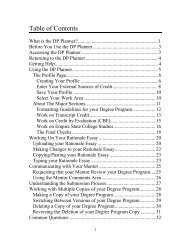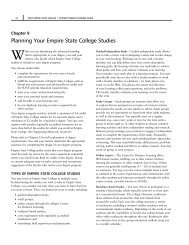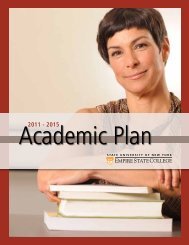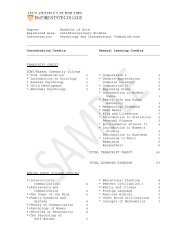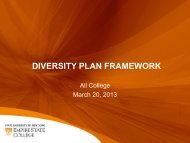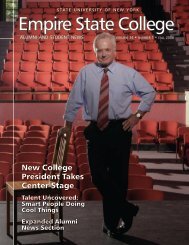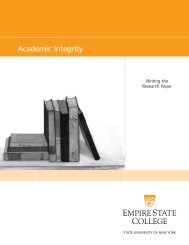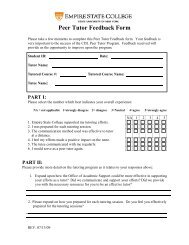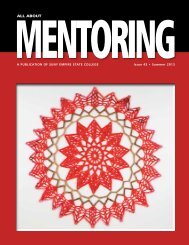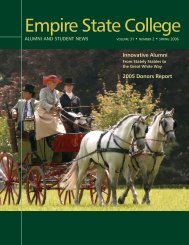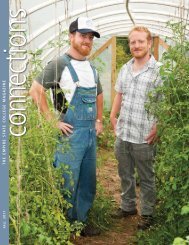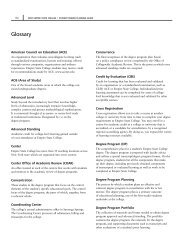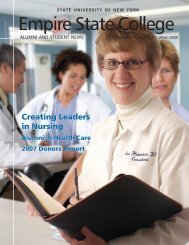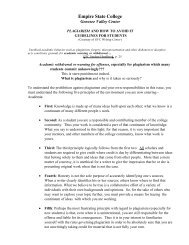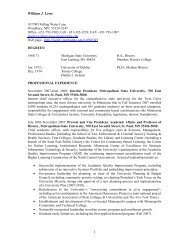All About Mentoring Spring 2011 - SUNY Empire State College
All About Mentoring Spring 2011 - SUNY Empire State College
All About Mentoring Spring 2011 - SUNY Empire State College
Create successful ePaper yourself
Turn your PDF publications into a flip-book with our unique Google optimized e-Paper software.
41<br />
<strong>Mentoring</strong>: A Social Relationship,<br />
An Academic Partnership<br />
John M. Beckem II, Center for Distance Learning<br />
Through a quick Google search,<br />
I found <strong>Empire</strong> <strong>State</strong> <strong>College</strong>:<br />
Everywhere and Online. Intrigued<br />
by the format and the <strong>SUNY</strong> affiliation, I<br />
applied for an area coordinator position at<br />
the college’s Center for Distance Learning<br />
(CDL), interviewed, and was offered the<br />
job. Prior to my start date, I re-read the<br />
job description and saw the “mentoring”<br />
portion, which seemed to be a large part of<br />
this “teaching” job. I called the dean, Meg<br />
Benke, and asked, “So what is mentoring”<br />
and she answered simply, “It’s similar to<br />
advising but from a bigger perspective. You<br />
correspond with students and help them to<br />
plan their degrees.”<br />
At the start of my new job with the college,<br />
I assumed I would be helping students<br />
choose “classes” from different topic areas<br />
and requirements to “customize” their<br />
degree programs.<br />
That’s the point where my mentoring<br />
career began.<br />
I learned that a mentor is not an advisor.<br />
<strong>Mentoring</strong> is more than course selection.<br />
<strong>Mentoring</strong> is a constantly-evolving<br />
process that changes with each person,<br />
program and point in time. <strong>Mentoring</strong> is<br />
a social relationship based on an academic<br />
partnership. I have celebrated grandbabies<br />
with my student mentees; I have coached<br />
them through military transitions; I sent a<br />
sympathy card to a now-graduate whose<br />
mom recently died. For the first time in<br />
my career, as a mentor, I have a chance to<br />
bring together all of my experiences and<br />
perspectives – academic, corporate and<br />
military – to help guide and shape the<br />
future of other learners. This is an<br />
opportunity and a gift.<br />
With a basic understanding of the mentoring<br />
philosophy, I’m ready to begin my first<br />
student relationship. Like any other smart<br />
professional, I ask my colleagues, “So what<br />
is degree program planning How do you<br />
actually do it”<br />
That’s the point where my mentoring<br />
career evolved.<br />
I realized that I felt exactly how our students<br />
feel when they begin – except I am not the<br />
person who is returning to school after<br />
raising kids for 20 years. I am not the bank<br />
vice president pressured to earn a bachelor’s<br />
degree by December <strong>2011</strong>. I am not the<br />
high school graduate trying to work, impress<br />
my parents and pay my car insurance,<br />
which is due next week. I am the person<br />
who needs to help students figure out how<br />
to choose 128 credits to create a balanced,<br />
quality degree program, consistent with<br />
<strong>SUNY</strong> and <strong>Empire</strong> <strong>State</strong> <strong>College</strong> policies,<br />
which will be accepted by the faculty<br />
assessment committee. I realized that to<br />
truly understand my mentees, I needed<br />
to embrace their concerns and be able to<br />
relate to the anxiety of a first-term <strong>Empire</strong><br />
<strong>State</strong> <strong>College</strong> student, from financial aid<br />
questions to academic research, technology,<br />
instructor communication concerns, and<br />
so much more.<br />
Motivated and empowered, I wanted<br />
to learn all I could to help students to<br />
be successful in their academic career at<br />
<strong>Empire</strong> <strong>State</strong> <strong>College</strong>. At CDL, I met with<br />
Cynthia Flynn, director of operations, to<br />
understand how the entire process works<br />
from recruitment to acceptance, in both<br />
paper and electronic formats. I met with<br />
Joe Boudreau, coordinator for special<br />
programs and retention, to find out what<br />
factors contribute most to student success<br />
at the college. I asked Craig Lamb, director<br />
of academic support, how I could help my<br />
students meet their various academic needs.<br />
I also spoke to Chuck VanVorst, who works<br />
for the college’s Office of Veteran and<br />
Military Education, to see what’s different<br />
about military students and the transitions<br />
they encounter when returning to college. I<br />
discussed student challenges and common<br />
issues with David Caso, director of student<br />
and academic services at CDL. I read the<br />
entire Student Degree Planning Guide,<br />
John Beckem<br />
highlighted and rabbit-eared 25 different<br />
pages, and asked CDL colleagues Dana<br />
Henson, Diana Hawkins and Ginger Knight<br />
for answers, guidance and clarification.<br />
Now ready to mentor, I scheduled my<br />
first student conference call … and the<br />
rest is history.<br />
That’s the point where my mentoring<br />
career matured.<br />
I now have over 35 mentees and my group<br />
is growing on a weekly basis. I have several<br />
students enrolled in my Planning and<br />
Finalizing the Degree course. To continue<br />
to learn more about the degree planning<br />
process, I have been both a participant<br />
and chair in several assessment committee<br />
meetings. I also partnered with Carol<br />
Carnevale as my “mentor buddy.”<br />
I am happy to be here, sharing my thoughts<br />
and experiences with each of you in this<br />
publication. In my first 12 months, I have<br />
researched, evolved and matured in my<br />
mentoring role. In order to capture my firstyear<br />
experiences in one place, I developed<br />
a mentor-blog at www.escmentor.blogspot.<br />
com. This is an interactive website where<br />
suny empire state college • all about mentoring • issue 39 • spring <strong>2011</strong>



